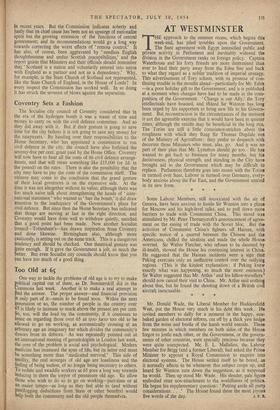AT WESTMINSTER
THE approach to the summer recess, which begins this week-end, has piled troubles upon the Government. The Suez agreement with Egypt intensified public and private activity in Parliament and inevitably widened the division in the Government ranks on foreign policy. Captain Waterhouse and his forty friends are more determined than ever to haul their party away from the Eden line and back to what they regard as a nobler 'tradition of imperial strategy. This advertisement of Tory schism, with its promise of con- tinuing trouble in the months ahead—particularly for Mr. Eden —is a poor holiday gift to the Government; and it is published at a moment when changes have had to be made in the com- position of the Government. ' Change is our Ally,' the Tory Intellectuals have boasted, and ifldeed Sir Winston has long been urged by his supporters to bring new life to his Govern- ment. But reconstruction in the circumstances of the moment is not the agreeable exercise that it would have been in quieter times, although the results may be beneficial in the long run. The Tories are still a little conscience-stricken about the roughness with which they flung Sir Thomas Dugdale out of the Ministry of Agriculture:. they prefer to despatch with decorum those Minister's who must, alas, go. And it was no part of their plan that Mr. Lyttelton should go too. He has wanted to get back to business for many months, but his decisiveness, physical strength, and standing in the City have brought aid to the Government which may be difficult to replace. Parliament therefore goes into recess with the Tories in turmoil over Suez, Labour in turmoil over Germany, every. body anxious about the Far East, and the Government untried in its new form. a * a Some Labour Members, still intoxicated with the air of Geneva, have been anxious to hustle Sir Winston into a plans for Moscow and his high-level talks, and to pull down more barriers to trade with Communist China. This mood was stimulated by Mr. Peter Thorneycroft's announcement of agree- ment on the easing of trade with the Soviet bloc. But the activities of Communist China's fighters off Hainan, with specific notice of a quarrel between the Chinese and the Americans, chilled the idealists and made the whole House worried. Sir Walter Fletcher, who refuses to be daunted by ill-health, showed the House his continuing interest in China. He suggested that the Hainan incidents were a sign that Peking exercises only an ineffective control over the outlying regions. (This is the kindest explanation : if Peking knew exactly what was happening, so much the more ominous.) Sir Walter suggested that Mr. Attlee and his fellow-travellers' should now cancel their visit to China. Mr. Attlee said nothing about that, but he found the shooting down of a British civil aircraft inexcusable. * * Mr. Donald Wade, the Liberal Member for Huddersfield West, put the House very much in his debt this week. He invited members to dally for a moment in the happy, sun- baked garden of electoral reform, cut off by a thick yew hedge from the noise and bustle of the harsh world outside. These few minutes in which members on both sides of the House forgot to jostle each other, or the Government, or the govern- ments of other countries, were specially precious because they were quite unexpected. Mr. E. L. Mallalieu, the Labour Member for Brigg (and a former Liberal), had asked the Prime Minister to appoint a Royal Commission to enquire into electoral systems. The House settled itself to be bored, as it normally affects to be whenever this subject crops up, and heard Sir Winston turn down the suggestion, as it supposed he would. Then up stood Mr. Wade. His slender, pale figure embodied utter non-attachment to the worldliness of politics. He began his supplementary question: Putting aside all party considerations. . . ' The House found these the most joyous five words of the day. J. F. B.


































 Previous page
Previous page